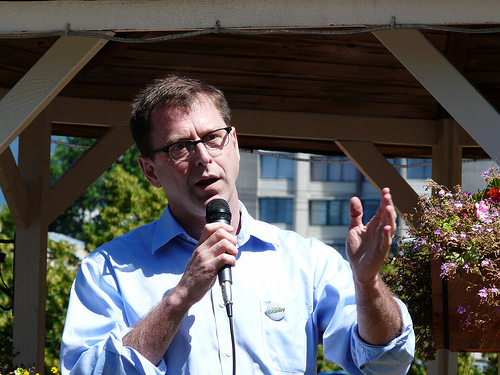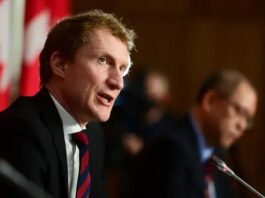By Joe Johnson (The Cascade) – Email
Print Edition: December 7, 2011
Adrian Dix, leader of the BC NDP and Official Opposition to the government, has a nearly two decade-long history with the party. and won the NDP’s leadership race this past April after the resignation of former leader Carole James. Now holding onto the reins of a party that is on the rise, he stands a good chance of being our next Premier. And as we close out the year, the busiest man in BC politics spoke with The Cascade on topics ranging from student issues, economics, political attacks, and the Occupy movement.
With the sitting of the legislature now having come to a close, do you feel the NDP was successful in its role as Official Opposition?
I think we were in this sense that one of [the] principle issues… I wanted us to drive in the session was… Community Living BC. There’s a crisis in the entire sector for adults with developmental disability. There’s a waitlist of 2800 people across British Columbia. The government was closing group homes, and closed 65 group homes and is claiming that no one was being displaced. I think we’ve proved pretty definitively that that was wrong. The government has now admitted what they said was inaccurate over the last year, and I think we’ve… pressured the government successfully… I think that’s what a good opposition does, they drive change even from the opposition side.
The latest Angus-Reid poll has support for the NDP now at 40 per cent and the Liberals behind at 31 per cent… What do you contribute this swing in popularity to?
I think it’s that the NDP is putting forth positive ideas and that we’re not campaigning as one person but we’re campaigning as a strong team. I think that the NDP caucus is performing in a unified and coherent way [so] that the ideas we’re putting forward, especially on economic issues, are reaching the public. And obviously, the government on their side seem out of gas and out of ideas.
It’s been nearly a decade since the freeze was lifted on post-secondary tuition in BC. While increases have been capped at the rate of inflation, it still means that it’s getting more expensive for students to advance their education. What is the NDP planning on doing to ease this cost burden for students?
…I think clearly this is a key issue in our province… Some people can’t afford to take a full course load, they have to work so it takes them longer to get their credentials in some cases. Other people are denied access entirely. And other people come out of post-secondary education with a huge debt, which dramatically affects their ability… [to] take the career path they want. They’re forced to take the highest paying job as opposed to following their dream.
So I proposed specifically this year to reinstate non-refundable student grants. As you know, the government not only more than doubled tuition fees, but they got rid of the Student Grant program in 2004. And we have the highest interest rates for student loans in the country. So I made a specific proposal after many, many meetings with students, at every part of the province, to discuss what they thought of non-refundable student grants… This is in the interest of the economy, I think, and obviously young people as well. So we’ve been specific and we’ve said how we’re going to pay for it. In that case, reinstating a minimum tax on the big banks.
With the many students from various programs graduating at universities across the province, one of the big questions is on the job market. This is even more of an issue with the world economy. The Liberals have unveiled their job plan, but what does the NDP plan look like?
Well, I think what’s wrong right now on the employment side, on the economic side, from the government, is that they haven’t got the fundamentals right. Really what their job plan is is just a list of potential private sector projects. And right now the government has decided to hire advertising agencies to sell the Premier’s jobs plan on the Premier’s behalf. It’s a communications exercise for the government. They had focus groups, they now have an advertising campaign, and I don’t think those are the priorities that most people think are important.
I think we’ve got to focus, one, on getting the fundamentals right – so, a skilled workforce… [People will] tell you that jobs of the future will require post-secondary education, and many people don’t have access to those skills today. There’s a gulf that’s not only affected by accessibility but the availability of programs. So point one is investing in our workforce so that we’re able to take the jobs of the future. We’re risking having a future where we have jobs without people and people without jobs. The second thing I think we need to address is the fact that… BC’s resources, which are a source of jobs and potential manufacturing, are increasingly being sent out without any manufacturing here. We’re seeing this dramatic increase in export of raw logs. So we’ve got to use BC resources to create jobs in BC. Thirdly, right now, there’s an urgent circumstance around the HST. The HST as you know, the failure of the government to have any plan to move back to the PST, is causing profound employment problems, especially in the residential construction sector and others that are hurting the economy in the immediate term. So, I think these are the kinds of approaches in getting the fundamentals right. Instead, we have a government that is not doing that, is picking fights with teachers rather than working with teachers to create an excellent public education system… And finally on trade, the government seems focused on promoting politicians when what we clearly need now is a focus on a trade promotion campaign that sets targets, that has real goals, and is sustained.
Your Advanced Education critic, Michelle Mungall – who actually visited UFV recently – has introduced a bill to regulate private post-secondary institutions. Why was this necessary?
Well… there have been a number of cases of abuse where private schools have failed and it’s been embarrassing for our province. A very significant number of students in our province get education at private post-secondary institutions. The government, when they deregulated and lowered standards, I think hurt BC’s reputation quite a bit. So we have to make sure as a government, even in those educational services we’re not providing, that people are protected, that often their tuition is protected, and that the quality of education meets what we expect in British Columbia… even if it’s a private institution, it’s our reputation that’s at stake.
Would [there be any problems with] expediting the transition back to the PST system from the HST… ?
I don’t think so. It took them eleven months to bring in the HST once they had announced it, but Mr. Falcon and Ms. Clark believe they can only get it back to the PST in 19 months. Now, the PST system is a system we had in place from 1948 on. So it’s not a new system for us. And it seems to me, in any event, that the government has truly failed the economy. The HST fiasco has affected our economy for four years. No one knows what the rules are going to be, and if you look at residential construction… realtors and people in construction [in Vernon] told me how much the government’s failure to have a plan, to have transition rules, to get back to the PST, never mind moving the date forward, was hurting their business and jobs and their community. And that’s true of every community. If you think of a community like Surrey, the residential construction industry is an $800 million annual industry in a community like Surrey, and in Abbotsford and Chilliwack this is true as well. And I think the government has simply failed. They seem more interested in punishing the people for voting against them than they do in addressing what is right for the economy, which is bringing back stability.
What is your take on political attacks, such as how the Liberals have gone after you and BC Conservative leader John Cummins?
Well, I think this is sadly a Liberal party not at its best at the end of its mandate after ten years in power. They seem angry that they’re not doing well and want to blame other people. The reality is that I think they’re out of step with public opinion… Students who are trying to look for work as they’re coming out of their post-secondary education, or are trying to pay for their post-secondary education while they’re there – they have more serious issues than Ms. Clark’s kind of attack program against her political opponents… I don’t think negative campaigning works that well. That’s why I have been pretty relentlessly positive since I’ve become leader of the NDP.
And I just have to ask, what do you make of the Occupy movement and how it’s mostly been suppressed?
Well, I think you have to differentiate between one protest and the movement. I’ve been raising issues on income inequality… I think it’s been a key part of every speech, every presentation I’ve given; it was a key part of the platform which we would have prepared if there had been an early election, and it’s a key priority for our party.
I think the problem with the demonstration in Vancouver… was that it seemed to become about the demonstration rather than about what we want to change in society. There [are more] techniques [to achieve these aims] than demonstrations… One of them is participating in an election, seeing the change happen. That’s what I’m focused on. But I think the Occupy movement across North America has raised important issues and I don’t think we should forget that.




